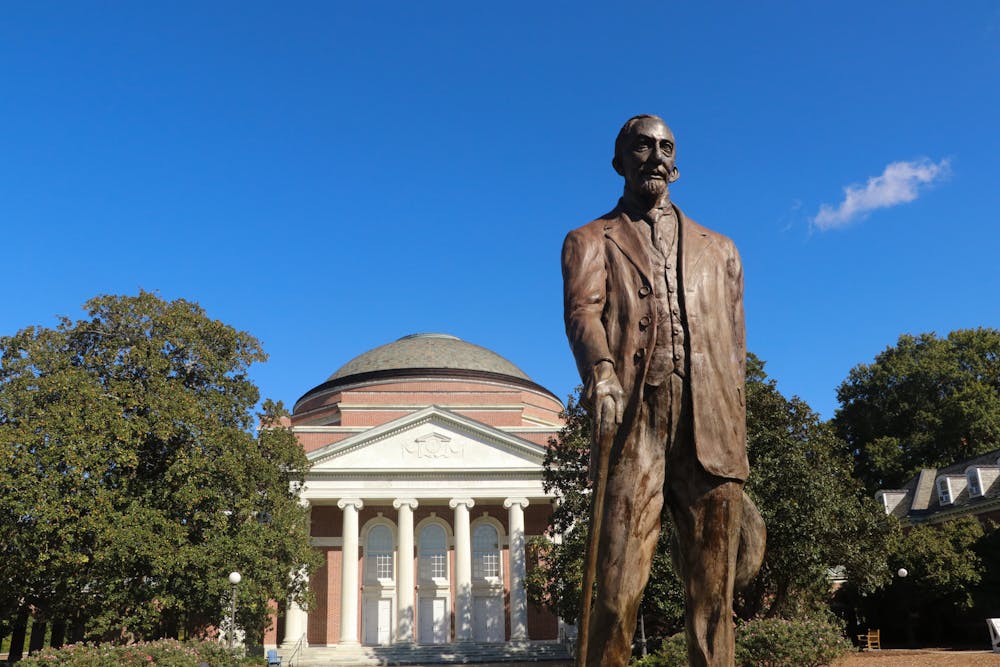Duke admitted 806 students to the Class of 2028, after receiving a record number of applications in its Early Decision round.
The University received 6,240 Early Decision applicants, which is over 1,000 more than any previous Early Decision round and represents a 28% increase from 2022, bringing the acceptance rate to a record low 12.9%.
According to Dean of Undergraduate Admissions Christoph Guttentag, part of the increase in the number of applications is due to the University’s new financial aid program for students from the Carolinas.
“The Carolinas Financial Aid Initiative played a role in the increase in applications. Clearly that had an impact in the number of students applying from both North and South Carolina,” Guttentag wrote in an email to The Chronicle. "We were confident that the Carolinas Financial Aid Initiative would encourage more students from the Carolinas to apply, but we didn’t anticipate the size of the increase in the rest of the applicant pool."
The Carolinas Financial Aid program provides full tuition grants to students from North and South Carolina with family incomes below $150,000. In November, the University received a $100 million dollar gift from The Duke Endowment, a private foundation in Charlotte, of which $60 million will be dedicated to expanding financial support for students, including through the Carolinas Financial Aid program.
Guttentag said in a release that 18% of admitted students in the Early Decision round come from the Carolinas, representing a 25% increase from last year. Of those admitted, 121 come from North Carolina and the remaining 24 hail from South Carolina.
“Duke always attracts phenomenally talented students,” Provost Alec Gallimore said in a release. “Our goal in providing more equitable access to a Duke education was to help more academically outstanding students from the Carolinas see Duke as an option. I’m so pleased that we will be admitting more students from the region we call home.”
The University also received an increased number of applications in the Southeast, Southwest and Midwest. Guttentag wrote that there was “no obvious reason” for this increase.
Duke saw an additional increase in first-generation admits and students indicating they would apply for financial aid, according to Guttentag. The increase comes after a September New York Times article described Duke as one of the least economically diverse elite universities in the country.
"Over half of the students we admitted in Early Decision indicated that they would apply for need-based financial aid," Guttentag wrote to The Chronicle. "That feels like a very positive step in creating a more economically diverse student body and in demonstrating Duke’s commitment to access and affordability."
“When we look at the number of first-generation students and the number of students who indicated that they would apply for financial aid, we were struck and pleased not only by the academic quality of the applicants but by the breadth of backgrounds that they represented,” Guttentag said in the release. “There was an astonishing number of very talented students, and this really was as challenging an early decision process as I've experienced.”
The University admitted 97 students through the QuestBridge National College Match Program, almost double the number of students admitted in 2022, and the highest number in its history.
“That increase is another representation of our commitment to expanding access to a Duke education and strengthening the economic diversity of our student body while maintaining the highest standards of academic excellence,” Gallimore said in the release.
Of the 806 students admitted, 625 plan to enroll in the Trinity College of Arts and Sciences and 181 plan to enroll in the Pratt School of Engineering. Additionally, 54% of admitted students identify as female, 8% are international and 13% are first generation. All students admitted through the Early Decision cycle are required to enroll upon learning their decision.
Along with the Carolinas, the largest share of early decision admits hail from California, New York, Florida and Texas.
This cycle marks the fourth year that the University is running undergraduate admissions test-optional, and the first that it is required to abide by the June Supreme Court decision which ruled that considering race as an independent factor when making admissions decisions is unconstitutional.
Guttentag wrote that 35% of admitted students applied without submitting standardized test scores.
The Class of 2027 had an Early Decision acceptance rate of 16.5%, which was previously the lowest Early Decision admissions rate in Duke’s history. The Class of 2026 had an Early Decision acceptance rate of 21%, and the Class of 2025’s was 17%.
Admissions decisions will be released 7 p.m. on Dec. 14.
This article was updated Thursday at 11:50 p.m. to include an additional statement from Guttentag.
Get The Chronicle straight to your inbox
Signup for our weekly newsletter. Cancel at any time.
Mia Penner is a Trinity junior and an audience engagement editor of The Chronicle's 120th volume.

Adway S. Wadekar is a Trinity junior and former news editor of The Chronicle's 119th volume.

